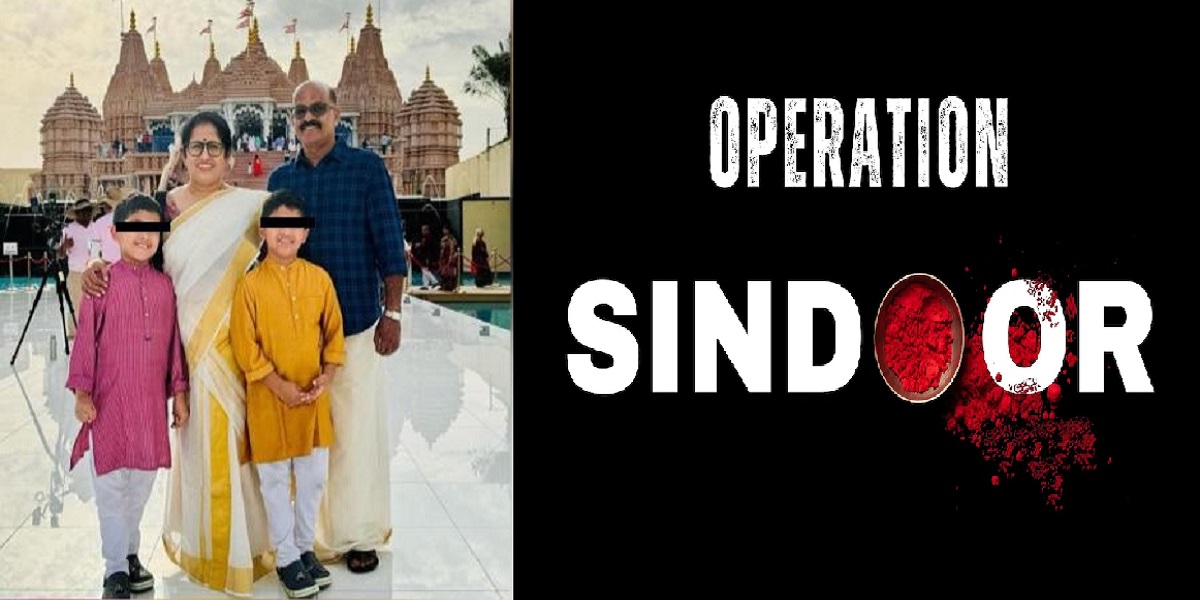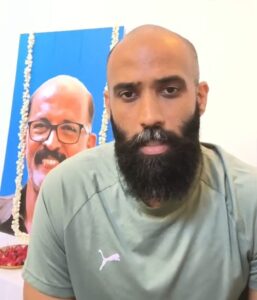Published May 07, 2025 | 3:22 PM ⚊ Updated May 07, 2025 | 3:22 PM

The sindoor that symbolised 37 years of marriage is no longer on her forehead. But the name Operation Sindoor carries a weight only she truly understands.
Synopsis: The Kochi home of N Ramachandran, killed in the Pahalgam terror attack, is filled with quiet relief as news of Operation Sindoor—India’s retaliatory strike—breaks. Though still grieving, the family finds some solace in the action taken against the perpetrators. Emotions run deep as media and political figures gather again, just days after mourning turned into national resolve
The home ‘Neeranjanam’ in Kochi’s Edappally is once again crowded with media and political party representatives, just like it was 15 days ago. But this time, the mood is different. It’s not a moment of celebration, but a moment of deep, quiet relief. Each member of this grieving family is breathing a little lighter today, even as their hearts remain heavy.
This is the home of N Ramachandran, the victim of the Pahalgam terrorist attack, who was shot dead by terrorists on 22 April.
Today, as news of Operation Sindoor, India’s retaliation against terrorist camps across the border, breaks, emotions are flooding this household in a way words can hardly capture.
The Ministry of Defence said on Wednesday, 7 May, that the country launched “Operation Sindoor” and hit terrorist infrastructure in Pakistan and Pakistan-occupied Jammu and Kashmir (PoK). The operation comes as a response to the recent terror attack in Jammu and Kashmir’s Pahalgam that killed 26 people.
In a press release, the ministry said that nine sites linked to planned terrorist attacks against India had been targeted. “Our actions have been focused, measured and non-escalatory in nature. No Pakistani military facilities have been targeted. India has demonstrated considerable restraint in selection of targets and method of execution,” the ministry said.
Ramachandran’s daughter Arathy R Menon, who witnessed the attack with her own eyes, is overwhelmed, not just with pride and relief, but with a deep sense of missing her father.
His wife, Sheela Ramachandran, sits quietly. The sindoor that symbolised 37 years of marriage is no longer on her forehead. But the name Operation Sindoor carries a weight only she truly understands. For a Hindu woman, sindoor is more than a mark, it is a bond. And now, that bond is remembered through the name of a military operation.
But in the middle of all this, two small voices see things very differently. Arathy’s 6-year-old twin sons, Drupath and Kedar, who also witnessed the horror of that day, don’t understand diplomacy, military strikes, or international politics. They only know one thing, the “bad guys” who took away their grandfather are no more. And to them, that is happiness.
When South First contacted Arathy, the first thing we inquired about was the reaction of the children to Operation Sindoor, because it’s important to understand how children perceive such sensitive situations.
“Fortunately, they are not frightened, but extremely happy. It’s like in a bedtime story where the demon is killed by the prince. Drupath and Kedar were extremely happy. For them, the army killed the ‘bad guys’ who killed their beloved muthassan (grandfather),” Arathy said.
The children are not yet old enough to fully grasp the gravity of the situation. But the absence of their grandfather has deeply affected them, especially since they witnessed everything unfold at Pahalgam. “In their language, those who killed muthassan are simply ‘bad guys’,” Arathy explained.
“We communicated what happened to them in a very sensitive manner. From morning itself, the media has been present at our home, so we had to explain things to the children in their own terms. Otherwise, they might have panicked. They saw something similar two weeks ago, but that was an entirely different situation,” she added.
“They were brought up abroad, so they had no real understanding of what the army is. But now, they know, the army are protectors. They saw it firsthand during the terrorist attack.”
During the incident, Drupath and Kedar were initially panicked. By evening, they had been shifted to a hotel room along with Arathy’s mother, where they were given security and food.
“So for them, on the same day, they encountered both good and bad people, those who helped us and those who harmed us. After we explained Operation Sindoor to them, they became extremely happy. Knowing that the ‘bad guys’ are no more gives them a sense of happiness and relief, just like us.”

Arathy R Menon
Arathy expressed strong support for India’s military action under Operation Sindoor, describing it as a source of solace during a time of immense personal loss. Speaking to South First, Arathy said she felt proud of India’s precise strike on terror camps located in Pakistan and Pakistan-occupied Kashmir, contrasting it with the ”cowardly” terrorist attack that shook Kashmir.
”I am proud of India’s strike. Our pain is irreplaceable, but this response brings a sense of relief. I hope our country continues to act decisively in the face of such brutality. As an Indian, I feel proud,” she said.
”They attacked innocent civilians with AK-47s on our soil, while India’s response was directed strictly at terror infrastructure. There’s a stark contrast, their act was rooted in cowardice, ours in courage,” Arathy added.
Arathy also appreciated the naming of the tri-service military offensive as Operation Sindoor, saying it held deep emotional value for families like hers.
”There couldn’t have been a more meaningful name. My mother felt the name resonated with her pain,” she said. ”She told me through tears that this name truly captures the grief of countless women who have lost their sindoor.”
She added, ”If my father were alive, he and my mother would have celebrated their anniversary. The name Operation Sindoor made my mother emotional, it struck a chord.”
When asked about her connection to Kashmiris during the tragedy, Arathy recalled how two Kashmiri men supported her in her darkest moments, one was her driver, Musafir, and the other, a stranger named Sameer. She now considers both of them her brothers.
”After Operation Sindoor, I had the chance to speak to one of them through a live segment on a news channel,” she said, expressing gratitude for their timely help and humanity during the crisis.

Aravind Menon
“At this moment of grief, this brings some sort of comfort and closure—to see that India has struck back at terrorist camps operating in Pakistan. We hope that this is phase one, and that it continues to strike such terror camps, their supporters, and backers. Let them think twice before even considering an attack on innocent civilians and the armed forces of our country.
I’m feeling so proud; my entire family is proud that this has happened. We thank PM Modiji, the armed forces, and all government officials who have taken this decisive action.
It is also heartening to see that the operation is named ‘Operation Sindoor.’ It is so meaningful, and we hope that all the victims of the terror attack feel some sort of justice and closure for their pain,” Aravind Menon, son of Ramachandran, told South First in a video message.
(Edited by Ananya Rao)

